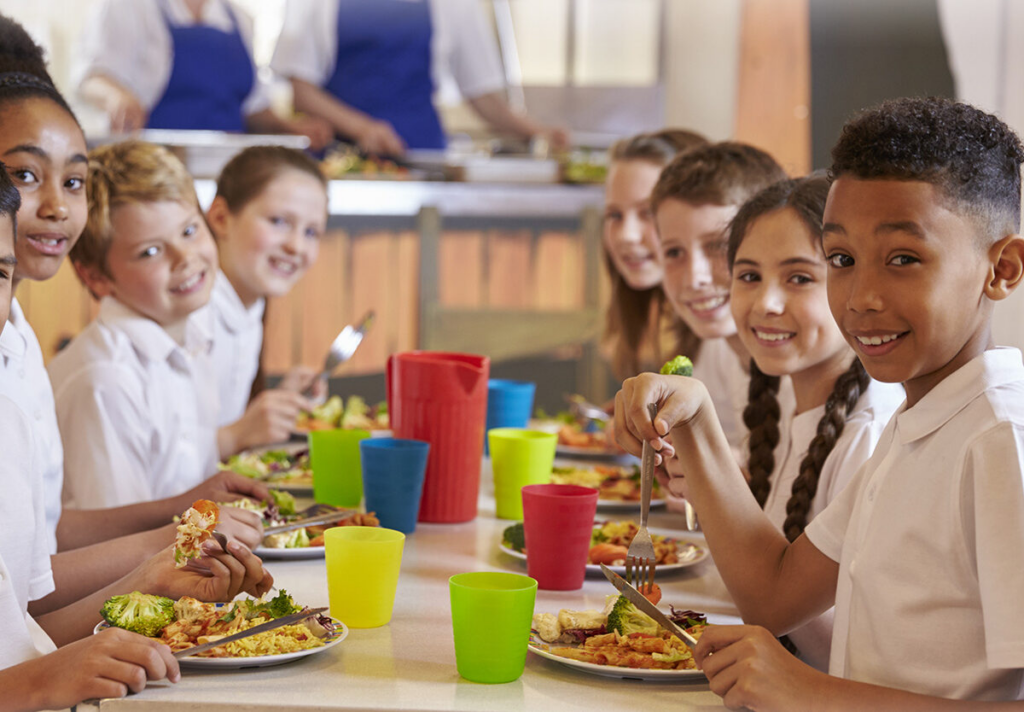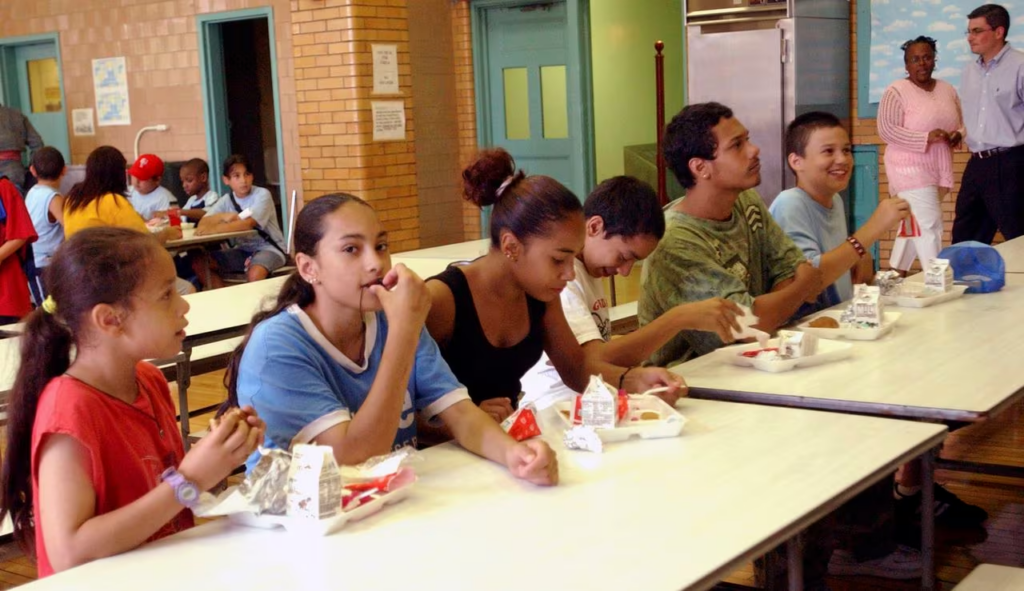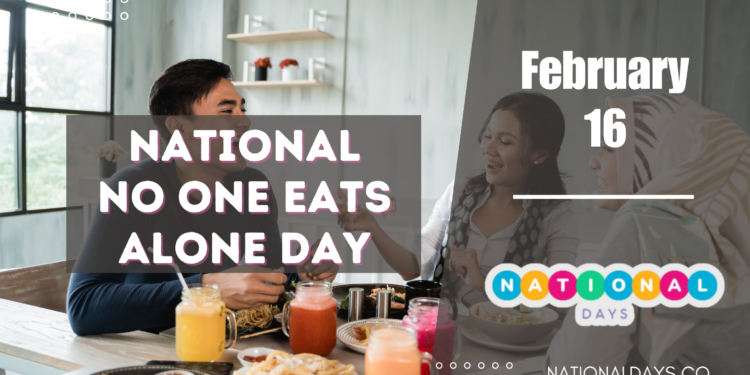NATIONAL NO ONE EATS ALONE DAY
#nationalnooneeatsaloneday
“National No One Eats Alone Day” is an initiative created by the nonprofit organization Beyond Differences. The campaign is focused on fostering inclusion and combating social isolation, particularly in schools. The goal of the day is to ensure that no student feels left out or alone during lunchtime.
History
National No One Eats Alone Day was established by the nonprofit organization Beyond Differences. The organization was founded in 2010 by parents whose daughter, Lili Smith, experienced social isolation due to a medical condition. Beyond Differences aims to create inclusive communities where every student feels valued and accepted, regardless of their differences.
The idea for National No One Eats Alone Day stemmed from the realization that many students face social isolation, particularly during lunchtime at school. Beyond Differences recognized the importance of fostering connections and building empathy among students to combat this issue. They launched the campaign to encourage students to reach out to their peers, invite others to join them at their lunch table, and create a more inclusive school environment.
Since its inception, National No One Eats Alone Day has gained momentum and has been widely embraced by schools across the United States. Each year, participating schools organize activities and events to promote inclusion and reduce social isolation among students. These efforts help raise awareness about the importance of kindness, empathy, and friendship in creating supportive and welcoming communities.
The exact date of National No One Eats Alone Day may vary each year, but it is typically observed in February. Beyond Differences continues to advocate for inclusivity and empathy in schools and communities, working towards their vision of a world where every student feels included and supported.

How to Celebrate National No One Eats Alone Day
Observing National No One Eats Alone Day is a meaningful way to promote inclusion and combat social isolation in schools. Here are some ideas for how to observe the day:
- Spread Awareness: Start by educating students, teachers, and parents about the importance of National No One Eats Alone Day and its mission to foster inclusion. Share information about the campaign through school announcements, newsletters, social media, and posters.
- Organize Activities: Plan activities and events that encourage students to reach out and connect with their peers. Consider organizing icebreaker games, group discussions, or team-building exercises that promote empathy and understanding.
- Create Inclusive Spaces: Ensure that lunchtime is a welcoming and inclusive experience for all students. Encourage students to invite someone new to join them at their lunch table or organize mixed-seating arrangements to facilitate interactions between different groups of students.
- Host Workshops: Offer workshops or presentations on topics related to empathy, kindness, and inclusion. Invite guest speakers, such as counselors, psychologists, or community leaders, to share their insights and experiences with students.
- Promote Acts of Kindness: Encourage students to perform acts of kindness throughout the day. Whether it’s offering a smile, complimenting someone, or lending a helping hand, small gestures can go a long way in making others feel valued and included.
- Start Conversations: Facilitate conversations about social isolation and its impact on students’ well-being. Encourage students to share their thoughts, experiences, and ideas for creating a more inclusive school environment.
- Support Peer Leadership: Empower students to take on leadership roles in organizing and promoting National No One Eats Alone Day activities. Peer-led initiatives can be particularly effective in engaging and inspiring their fellow students.
- Reflect and Evaluate: Take time to reflect on the day’s activities and evaluate their impact on school culture and student relationships. Use feedback from students, teachers, and staff to identify areas for improvement and plan future initiatives.
By observing National No One Eats Alone Day, schools can promote empathy, compassion, and inclusion among students, fostering a positive and supportive learning environment for all.
“People will forget what you said. People will forget what you did. But, people will never forget how you made them feel.”
–Maya Angelou
National No One Eats Alone Day FAQs
- What is National No One Eats Alone Day?
National No One Eats Alone Day is an initiative aimed at combating social isolation and promoting inclusion in schools. It encourages students to reach out to their peers and ensure that no one feels left out or alone during lunchtime. - When is National No One Eats Alone Day?
National No One Eats Alone Day is typically observed in February each year. The exact date may vary depending on the organization or school participating in the initiative. - Who started National No One Eats Alone Day?
National No One Eats Alone Day was established by the nonprofit organization Beyond Differences. The organization was founded by parents whose daughter experienced social isolation due to a medical condition. - Why is National No One Eats Alone Day important?
National No One Eats Alone Day is important because it raises awareness about the prevalence of social isolation among students and promotes empathy, kindness, and inclusion in schools. It encourages students to build connections with their peers and create a supportive and welcoming environment for all. - How can schools participate in National No One Eats Alone Day?
Schools can participate in National No One Eats Alone Day by organizing activities, workshops, and events that promote inclusion and combat social isolation. This may include encouraging students to invite someone new to join them at their lunch table, hosting discussions on empathy and kindness, and creating opportunities for students to connect with one another. - What are some ideas for National No One Eats Alone Day activities?
Activities for National No One Eats Alone Day can include icebreaker games, team-building exercises, group discussions, workshops on empathy and inclusion, and acts of kindness initiatives. The goal is to create opportunities for students to interact and form connections with their peers. - How can parents support National No One Eats Alone Day?
Parents can support National No One Eats Alone Day by talking to their children about the importance of inclusion and kindness, encouraging them to reach out to their peers, and modeling inclusive behavior at home. They can also communicate with schools to find out how they can get involved in activities related to the initiative. - Is National No One Eats Alone Day only for schools?
While National No One Eats Alone Day is primarily focused on schools, the principles of inclusion and kindness promoted by the initiative can be applied in various settings, including workplaces, community organizations, and social groups. The goal is to create a culture of inclusion wherever people gather.







Top 5 Ways to Celebrate National No One Eats Alone Day:
- Host a Inclusive Lunch Event: Organize a special lunch event at your school, workplace, or community center where everyone is encouraged to sit with someone new. Provide conversation starters or icebreaker activities to help facilitate interactions and create a welcoming atmosphere.
- Launch a Buddy Bench Program: Introduce a “buddy bench” on the school playground or in a communal area where students can sit if they’re feeling lonely or in need of a friend. Encourage students to look out for their peers sitting on the bench and invite them to join their activities.
- Conduct Empathy Workshops: Arrange workshops or assemblies focused on empathy and inclusion. Invite guest speakers, such as counselors, psychologists, or individuals who have experienced social isolation, to share their stories and insights. Provide students with tools and strategies for building connections and supporting one another.
- Create Inclusive Activities: Plan inclusive activities throughout the day that promote teamwork, cooperation, and understanding. This could include group games, art projects, or team-building exercises that encourage students to work together and appreciate each other’s differences.
- Promote Acts of Kindness: Launch a school-wide or community-wide campaign to promote acts of kindness and inclusion. Encourage students to perform random acts of kindness, such as complimenting their peers, offering to help someone in need, or inviting someone new to join their group activities. Provide recognition or rewards for students who demonstrate exceptional kindness and empathy.
By celebrating National No One Eats Alone Day in these ways, you can help foster a culture of inclusivity, empathy, and kindness in your school or community, ensuring that no one feels left out or alone.
























